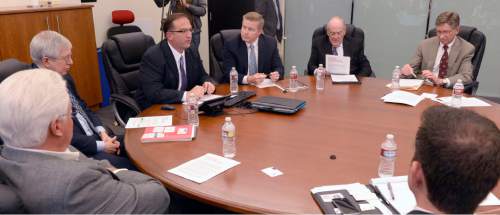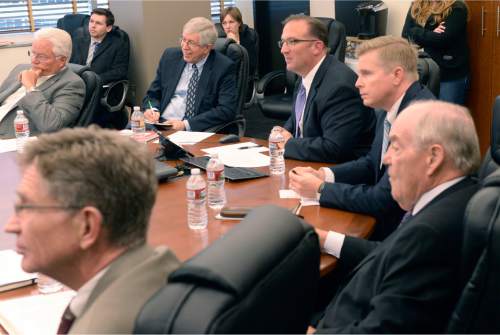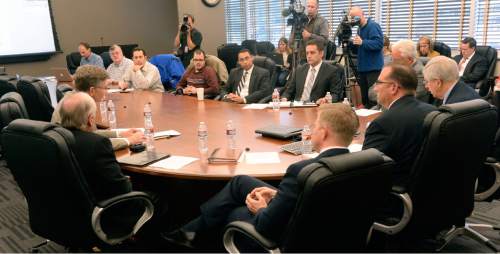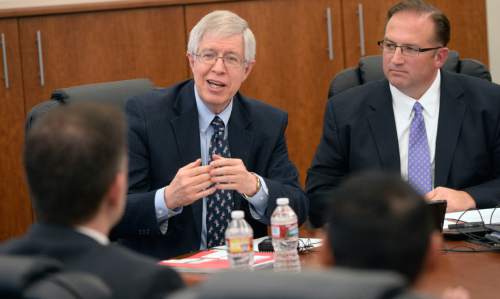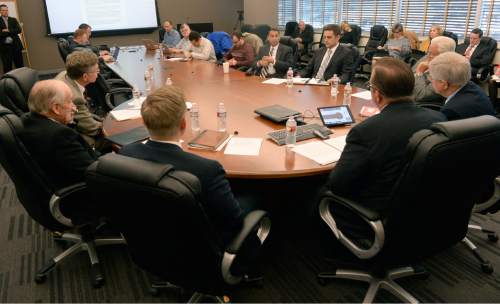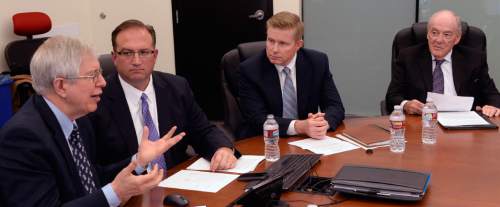This is an archived article that was published on sltrib.com in 2014, and information in the article may be outdated. It is provided only for personal research purposes and may not be reprinted.
Utah business leaders long had planned to call again Thursday for Congress to pass immigration reform, but their event veered into an impromptu debate about whether President Barack Obama is helping or hurting that with his new executive orders.
Most said Obama's plans to shield up to 5 million undocumented immigrants from deportation will poison the water with the incoming GOP Congress. Some said it may help prod reform. Others warned it is just a temporary fix, arguing that permanent solutions through congressional action remain needed.
"I don't think it helps because it's going to cause friction with the new Congress that's Republican," said Jonathan Johnson, chairman of Overstock.com, who hosted the round table of leaders originally intended to explain why Utah businesses need immigration reform.
"While I think it's probably the wrong thing for him to do, there's a possibility that it starts a dialogue to push Republicans to move more quickly," he said. "Sometimes pushing in the wrong direction can get us moving in the right direction."
Dale Cox, president of Utah's AFL-CIO, agreed — to a point.
"Maybe in six months we will look back and see this started the dialogue," he said. "It definitely has people talking more about it today than they did yesterday."
"Unfortunately," said Jorge Dennis, president of EnviroKleen, "this new Congress wasn't even given an opportunity to try to create a dialogue with him" before Obama acted. He added that the Democratic president seems to be trying to do the right thing, but "I don't agree with" his means.
Stan Lockhart, government-affairs manager for IM Flash Technologies and a former Utah GOP chairman, said Obama would have been wiser to spell out his vision for reform and invite the new Congress to work with him.
But now, Lockhart said, "it's just hard to see a clear path to success."
Ross Romero, vice president of Zions Bank and a former Democratic leader of the Utah Senate, said Obama had waited for House Republicans to act on a bill passed by the Senate nearly two years ago, but they did little with it. He said Obama's action "might not have happened today" if Republicans gave the issue earnest attention.
"He's bypassing the process," complained Stan Parrish, president of the Sandy Chamber of Commerce and a former GOP candidate for Congress.
He said the biggest problem is "this is another Band-Aid. It's not a long-term approach." He said a new president in two years could unravel Obama's orders, "and it seems like it will create more problems than it solves if that happens."
Similarly, Lew Cramer, president and CEO of Coldwell Banker Commercial Intermountain, said businesses seek certainty on immigration law — even if they may not like the policy. He said the temporary order creates uncertainty. "I'm certain lawsuits will be filed in the morning, and we need certainty."
Tim Wheelwright, moderator of the round table and an immigration attorney, noted former Presidents Ronald Reagan and George H.W. Bush used similar executive action to protect from deportation some immigrants left out of a 1986 amnesty bill until Congress years later passed legislation to make the temporary action permanent.
"We can look to history to see how executive action has been used to shake loose legislative policy," Wheelwright said, "and it happened to be in the context of immigration and it happened to be with two Republican executives."
Despite the debate on Obama's action, the main purpose of Thursday's discussion — sponsored by the Partnership for a New American Economy — was to continue a series of events in recent years by business leaders pushing for congressional immigration reform.
The group contends that Utah high-tech companies are not able to expand because they cannot get visas for needed foreign nationals to work here.
"We bring people to our universities in America, train them with our best and brightest," Overstock's Johnson said, "and then don't give them visas to come work here."
EnviroKleen's Dennis said Utah companies also need immigration reform to solve a shortage of workers in some traditionally low-wage jobs that others don't want. The AFL-CIO's Cox said changes would stop some unscrupulous businesses from not paying or underpaying immigrant workers who worry their bosses could have them deported if they complain.


